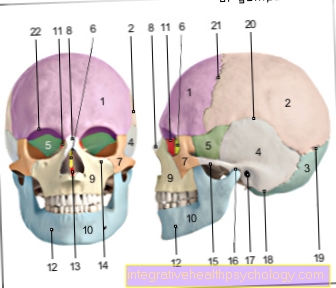psychiatrist
What is a psychiatrist?
A psychiatrist is a doctor who has completed specialist training in psychotherapy and psychiatry. He mainly deals with the diagnosis, treatment and therapy of mental illnesses. Mental illnesses mainly affect perception and thinking and are quite common in our society.

In contrast to a psychotherapist who has completed a degree in psychology and psychotherapy training, the specialist as a psychiatrist is preceded by a medical degree and at least five years of specialist training.
Qualified psychologists or psychologists with a master’s degree are people who have completed a degree in psychology but have not been trained as a psychotherapist. A psychotherapist is licensed to treat patients, but is not allowed to prescribe medication.
This privilege is reserved for the psychiatrist, for example, he can prescribe antidepressants for depression. Often psychiatrists also have a specialist in neurology and can thus diagnose, research and treat mental illnesses.
Psychiatrists, psychologists and psychotherapists are legally protected titles and are reserved for those who have completed the relevant training. A psychological counselor does not have to have completed any of the training courses mentioned above to be able to use this title.
If there is a suspicion of a mental illness, patients are usually referred to a psychiatrist by their family doctor. A psychiatrist usually has normal health insurance approval.
Some psychiatrists have further specialized in the field of forensic psychology. This border area between medicine and law focuses primarily on legal issues, such as the criminal liability of criminals.
Are psychiatrists doctors or not doctors?
The title of psychiatrist is a so-called protected designation in Germany. Only people who have completed a medical degree and the subsequent specialist training are allowed to call themselves psychiatrists. The titles of psychologist and psychotherapist must be distinguished from this designation. This differentiation is shown in practice primarily by the fact that only psychiatrists are allowed to use drugs for the treatment of mental illnesses. This is due to the fact that they have a better understanding of the mode of action and side effects of the drugs used through their medical studies and specialist training. In addition, psychotropic drugs, i.e. drugs that are used to heal mental illnesses, often interact with other drugs. In order to be able to adequately assess this interaction, completing a medical degree is a necessary prerequisite.
Why are psychiatrists weird?
Some people get the impression from the department and the approach of a psychiatrist that these are 'weird'. This is probably due to the fact that psychiatrists often want to know as much as possible about the thoughts and feelings of the patient during a conversation in order to be able to make a possible diagnosis of the disease at hand. Psychiatrists often have to ask the patient very private and uncomfortable questions in order to be able to fully understand the patient. It is understandable that this is initially uncomfortable for many people. However, it would be wrong to attribute this type of diagnosis to the nature of the doctor.
Are psychiatrists charlatans?
Psychiatrists are no more charlatans than other medical specialists are. As already described above, a medical degree and specialist training must be completed in Germany for the title of psychiatrist. Thus the accusation of 'charlatan' would be wrong in this context. The same applies to the job title of psychologist and psychotherapist. Since these titles are protected names in Germany, it is a criminal offense to use them without the appropriate training and approbation. Such an offense can be punished with up to one year in prison.
Are Psychiatrists Sick Or Crazy Themselves?
To call all psychiatrists 'sick themselves' or 'crazy' would be offensive and fundamentally wrong. A psychiatrist deals with diagnosis, therapy and research of mental illnesses. Therapy usually consists on the one hand of the administration of medication, so-called psychotropic drugs, and therapy discussions. The aim of these discussions is to understand the thoughts and feelings of the patient in order to be able to diagnose and treat a possible disease.These therapy discussions are absolutely necessary in the treatment of mental illnesses and are found to be very helpful by patients. Calling psychiatrists 'crazy' only because of their interest in the human psyche and the therapeutic methods used is therefore incorrect.





























